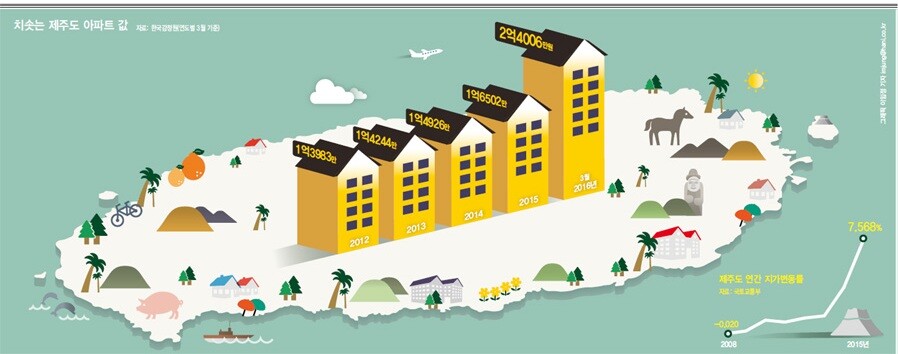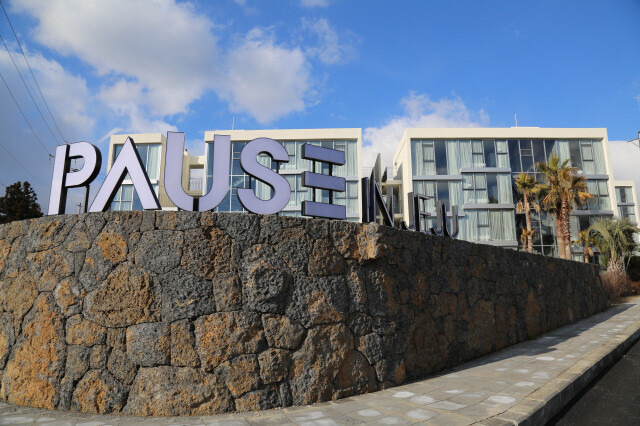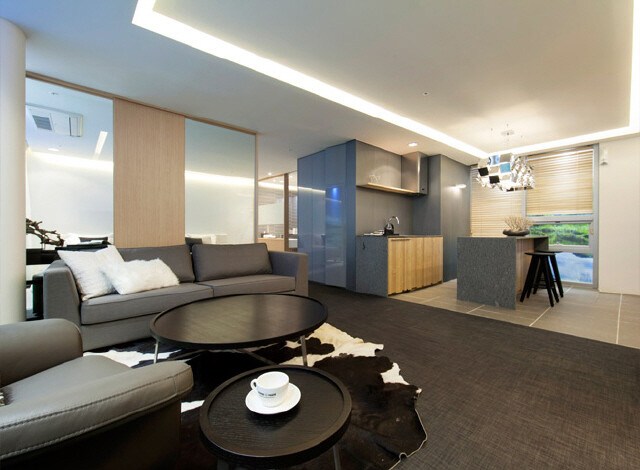hankyoreh
Links to other country sites 다른 나라 사이트 링크
Seeking a break from the grind, more are heading to Jeju Island for one month stays

Next month, an office worker surnamed Kim has the rare opportunity to take an entire month off work, and he is planning to spend it in his dream destination of Jeju Island.
Kim’s past vacations to the island have always consisted of a few days of sightseeing at the island’s main attractions, and he had always felt like something was lacking.
Kim made up his mind to go on the trip after one of his friends recently introduced him to some lodgings near Seogwipo that are perfect for a month’s stay. The lodgings are clean and safe, and there are also staff on hand to clean rooms when guests are out.
“I’m planning to go to the Olle Hiking Trails and some of the oreums,” said Kim, referring to small hills that are evidence of Jeju’s volcanic past. “For most of the time, though, I’m just going to go for walks around the neighborhood and Seogwipo and enjoy a quiet and relaxing time in my accommodations.”
A new style of travel called a “one-month stay” - that involves going somewhere new and unfamiliar and staying there for a month - is gaining popularity on Jeju Island. In contrast with the “sightseeing” approach to travel, which usually consists of going somewhere to check out the sights and visit good restaurants, a “one-month stay” is oriented around staying in one place for at least one month in order to find some relief from one’s stressful routine.
The appeal of such a trip goes beyond visiting famous sightseeing spots, taking pictures and looking for good food. Rather, it is found in spending a month amid Jeju’s unique natural landscape and in having a close encounter with the local lifestyle.
Recently, a number of websites and blogs have appeared offering reservations at accommodations for those interested in spending a month on the island.
The “one-month stay” trend on Jeju Island springs from the combination of the Jeju’s inherent natural charm and a growing desire among South Koreans for a break from the daily grind.

Looking for Kinfolk Life in Jeju
The “kinfolk life” exemplified by singer Lee Hyori, who moved to Jeju immediately after her marriage in 2013, has also played a role in piquing the curiosity of the general public. “Kinfolk life” refers to the pursuit of a slow, simple, natural and relaxing life, a life that consists of tending a garden at home and sharing the produce of that garden with neighbors and guests. Deriving from a lifestyle magazine in the city of Portland called “Kinfolk,” the word also refers to the social trend of more people seeking a healthier and more environmentally conscious lifestyle.
The growing interest in one-month stays on Jeju Island is also having a considerable impact on the real estate market. For one, it is fuelling the development of “rental houses”, which are designed to be more affordable and convenient for long-term travelers than hotels or condos. While Jeju is home to numerous leisure accommodations, including hotels and resorts, as one might expect from an international tourist destination, until recently there have been few accommodations suitable for travelers interested in staying for one month or longer.
Pause in Jeju, which opened in Seogwipo last month, is one of these new rental houses that are aimed at the one-month stay crowd. Composed of 376 small apartments units (between 19 and 49 square meters), the residential facility was built with the express purpose of renting the units out, a plan to which the unit owners have given their consent.
Pause in Jeju contains an apartment block that permits residents to bring their pets – a first for Jeju Island – and it also contains a variety of facilities, including a swimming pool, a sauna, a barbecue and a restaurant. Depending on the size of the unit, residents at Pause in Jeju pay from 1.19 million to 3.57 million won (US$1,030-3,100) a month.
This means that the smallest units – which can accommodate one or two people – are available for less than 40,000 won (US$35) a day.
Various accommodations for one month stays
Recently, there has also been an increasing supply of townhouses, which families traveling as a unit can use at any time as a second house or a shared cabin.
At Hado Hills, a complex of 48 separate townhouses between 68 and 84 square meters in size that is being built in Hado Village, Gujwa Township, Jeju City, tenants can stay at their units when they like and rent them out when they are away. The complex has various amenities, including a coffee shop, a restaurant, an art gallery, a guesthouse, an outdoor pool and a spa for each tenant.
Haedong Green and Gold in the Jocheon Township of Jeju City, which will soon be accepting guests, was conceived as a resort-style residential complex at which unit owners can split the equity on units and use them as shared vacation homes. With 96 units whose area ranges from 34 to 84 square meters, the complex offers a number of different designs, including studio apartments, loft apartments and apartments with terraces.
There are also a number of townhouse complexes in Seogwipo with units currently on sale, including Days Hill (33 units) in Topyeong Neighborhood and Honey County in Gwangpyeong Village. At Honey County, would-be occupants can build their unit according to their own preferences, whether they want a small 50m square meter “country house” to visit on the weekend or a luxurious mansion of their own.

”Glamping” options also available
There are also some unconventional complexes that are selling units in “glamping villages” they have set up, keeping step with the growing number of travelers who go glamping - camping outdoors at sites that provide the tents and other amenities. (“Glamping” is a word that combines “glamour” and “camping.”)
At Elysium Village, located in Aewol Township in Jeju City, a 40 square meter single-story glamping shack is built on each plot (ranging from 168 to 331 square meters in size). The village also provides an outdoor swimming pool, a performance hall, sports facilities and a farming experience zone so that travelers can enjoy glamping any season of the year.
Another business model that has been launched is the “unit-based hotel,” which parcels out hotel rooms to buyers who then receive a share of the proceeds.
One such hotel is Coop City Hotel Harbor View, in Namwon Township Seogwipo, which is currently looking for buyers for its 306 rooms (21.7 square meters in size). After construction is complete, the hotel will be managed by a professional hospitality company.
In the future, ordinary houses on Jeju Island are also expected to give one-month stay travelers another option for their lodgings.
The Special Act for the Designation and Operation of Regulation-Free Zones to Promote Regional Strategic Industries, a bill that the South Korean government submitted to the National Assembly last month, would set up a “home sharing” system in South Korea. This system would allow homeowners to provide lodgings to visitors using their entire house (below 230 square meters of total floor space) or an empty room in their house for up to 120 days a year. All that homeowners would have to do is register with their city, county or district.
Home sharing could be another option
While mobile platforms such as Airbnb that allow people to rent out their house to lodgers are spreading around the world, there has been no legal grounds for such activity in South Korea, and that is what this bill is designed to rectify. The government is planning to implement the program on a trial basis in the latter half of the year, designating Gangwon, Busan and Jeju as three “regulation-free zones.”
Limiting the number of days during which a house can be rented out to 120 appears to reflect concerns that allowing people to rent out their homes year-round would likely create friction with the existing hospitality industry.
However, the only homes that are eligible for home sharing are those that are already zoned as residences – including detached houses and various kinds of apartments. The regulations would exclude “officetels” and other residences that are technically zoned as businesses. On Jeju Island in particular, this would make it possible for existing houses in fishing villages to be rented for affordable prices to out-of-towners looking for a home away from home.
The current cost of spending a month on Jeju Island varies considerably according to the quality of the lodgings and their amenities. Homestays and pensions, which attract the most travelers, usually run between 1.5 and 2 million won a month, with the price of lodgings proportional to their size and the number of amenities.
For detached townhouses, there is a wide range of prices from 1 to 3 million won a month, depending on the size. Some of the smaller apartment-style lodgings are even available for less than 1 million won a month.
These days, there is also an increasing number of old farmhouses being remodeled and turned into accommodations for one-month stay travelers. At one shared house (only available for women) in Haengwon Village, which is popular for its location on a quiet seaside stretch of the Olle Trail, travelers can stay for just 495,000 won a month. The house includes three separate bedrooms, with travelers sharing the living room, kitchen and bathroom.
With the rising popularity of the one-month stay, there has been a big boost in interest among the general public in recent months for the detached townhouses and multi-unit apartments that have units for sale on Jeju Island. Customers have a wide array of options, ranging from townhouses that can be used as vacation homes to occasional lodgings that can be rented out for some extra income when the owners are away.
But costs could be a problem
Nevertheless, experts urge caution, since many of these options are quite expensive. In the case of townhouses, which have been selling briskly in recent months, even the smallest units (50 to 60 square meters in area), cannot be had for less than 300 million won.
And while there are numerous companies who recruit buyers willing to rent out their units by guaranteeing rental income for a certain period of time, it is also important to remember that these companies may be hard pressed to pay the rental income they have promised if they face a high vacancy rate or other business difficulties.
“You’ve got to find out whether unit owners can still receive the rental income they are promised even if the company has more trouble renting out the property than it expected,” said Kim Gyu-jeong, a real estate analyst at NH Investment & Securities.
By Choi Jong-hoon, business correspondent
Please direct questions or comments to [english@hani.co.kr]
Editorial・opinion
![[Guest essay] The real reason Korea’s new right wants to dub Rhee a founding father [Guest essay] The real reason Korea’s new right wants to dub Rhee a founding father](https://flexible.img.hani.co.kr/flexible/normal/500/300/imgdb/original/2024/0423/8317138574257878.jpg) [Guest essay] The real reason Korea’s new right wants to dub Rhee a founding father
[Guest essay] The real reason Korea’s new right wants to dub Rhee a founding father![[Column] ‘Choson’: Is it time we start referring to N. Korea in its own terms? [Column] ‘Choson’: Is it time we start referring to N. Korea in its own terms?](https://flexible.img.hani.co.kr/flexible/normal/500/300/imgdb/original/2024/0423/3617138579390322.jpg) [Column] ‘Choson’: Is it time we start referring to N. Korea in its own terms?
[Column] ‘Choson’: Is it time we start referring to N. Korea in its own terms?- [Editorial] Japan’s rewriting of history with Korea has gone too far
- [Column] The president’s questionable capacity for dialogue
- [Column] Are chaebol firms just pizza pies for families to divvy up as they please?
- [Column] Has Korea, too, crossed the Rubicon on China?
- [Correspondent’s column] In Japan’s alliance with US, echoes of its past alliances with UK
- [Editorial] Does Yoon think the Korean public is wrong?
- [Editorial] As it bolsters its alliance with US, Japan must be accountable for past
- [Guest essay] Amending the Constitution is Yoon’s key to leaving office in public’s good graces
Most viewed articles
- 1[Guest essay] The real reason Korea’s new right wants to dub Rhee a founding father
- 2[Column] ‘Choson’: Is it time we start referring to N. Korea in its own terms?
- 3Why Korea shouldn’t welcome Japan’s newly beefed up defense cooperation with US
- 4Terry Anderson, AP reporter who informed world of massacre in Gwangju, dies at 76
- 5[Column] The clock is ticking for Korea’s first lady
- 6[Editorial] Japan’s rewriting of history with Korea has gone too far
- 7Opposition calls Yoon’s chief of staff appointment a ‘slap in the face’
- 8Senior doctors cut hours, prepare to resign as government refuses to scrap medical reform plan
- 9[Column] The president’s questionable capacity for dialogue
- 10Video evidence surfaces showing Korean comfort women were massacred by Japanese military